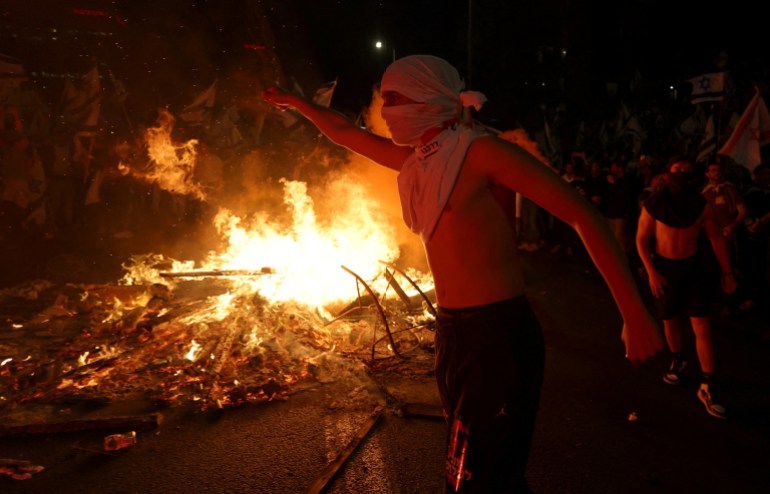Mass protests in Israel after Netanyahu fires defence minister
Tens of thousands of protesters have taken to the streets in cities across Israel in a spontaneous outburst of anger after Prime Minister Benjamin Netanyahu abruptly fired his defence minister for challenging his judicial overhaul plan.
Protesters in Tel Aviv, many wearing blue and white Israeli flags, blocked a main highway late on Sunday and lit large bonfires, while police scuffled with protesters who gathered outside Netanyahu’s private home in Jerusalem.
The unrest deepened a monthslong crisis over Netanyahu’s plan to overhaul the judiciary, which has sparked mass protests, alarmed business leaders and former security chiefs, and drawn concern from the United States and other close allies.
Netanyahu’s dismissal of Defence Minister Yoav Gallant signalled that the prime minister and his allies will barrel ahead this week with the overhaul plan. Gallant had been the first senior member of the ruling Likud party to speak out against it, saying the deep divisions were threatening to weaken the military.
But as droves of protesters flooded the streets late into the night, Likud ministers began indicating a willingness to hit the brakes. Culture Minister Micky Zohar, a Netanyahu confidant, said the party would support him if he decided to pause the judicial overhaul.
Israeli media said leaders in Netanyahu’s coalition were to meet on Monday morning. Later in the day, the grassroots protest movement said it would hold another mass demonstration outside the Knesset, or parliament, in Jerusalem.

‘Red line’
Netanyahu made the decision to sack Gallant after the former navy admiral warned on Saturday that the overhaul plans risked “a clear, immediate and tangible threat to the security of the state” and called for them to be halted.
“At this time, for the sake of our country, I am willing to take any risk and pay any price,” Gallant said in his televised address.
In announcing Gallant’s dismissal, Netanyahu’s office did not name a replacement nor give any other details. “Prime Minister Benjamin Netanyahu has decided this evening to dismiss Defence Minister Yoav Gallant,” it said.
Shortly afterwards, Gallant, 64, wrote on Twitter: “The state of Israel’s security has always been and will always be my life’s mission.”
As protesters poured into the streets, police used water cannons to push them back from Netanyahu’s residence in Jerusalem, while in Tel Aviv — where hundreds of thousands have taken to the streets since the beginning of the year — protesters lit a large bonfire on a main highway.
Clashes were reported in Tel Aviv as police moved in to clear the highway and put out the fires.
Opposition leaders Yair Lapid and Benny Gantz issued a joint statement condemning Netanyahu’s moves.
“State security cannot be a card in the political game. Netanyahu crossed a red line tonight,” they said, calling on the Likud party not to have a hand in “the crushing of national security”.

Adding to the pressure, the head of the Histadrut labour federation, the umbrella organisation for hundreds of thousands of public sector workers, said he was “astonished” by Gallant’s removal and promised a “dramatic” announcement on Monday.
Israel’s consul-general in New York said he was resigning over the dismissal. Israel’s research universities announced they would stop holding classes due to the legislative push, calling for its immediate freeze.
‘Constitutional crisis’
The turmoil comes at a critical moment in the passage of the legislation, with a bill giving the executive more control over the appointment of judges expected to be brought for ratification this week in the Knesset, where Netanyahu and his allies control 64 out of 120 seats.
Netanyahu and his allies say the plan — which also seeks to grant parliament the authority to overturn Supreme Court decisions — will restore a balance between the judicial and executive branches and rein in what they see as an interventionist court with liberal sympathies.
But critics say the laws will remove Israel’s system of checks and balances and concentrate power in the hands of the governing coalition. They also say that Netanyahu, on trial for corruption charges, has a conflict of interest.
“What the government wants to do is not to correct or to fix or amend the judicial system, so that it will be more just. Exactly the opposite. They want to take control over the judicial system,” said Ofer Cassif, an Israeli politician and Knesset member for the leftist Hadash party.
“I think that we should refer to the situation not as a judicial overhaul, but as a regime coup,” he told Al Jazeera.
“Netanyahu wants to turn Israel from an ethnocracy – because Israel in my view has never been a democracy, because this state is based on a Jewish supremacy, so it cannot be regarded as a democracy from the first place – but it’s going to be under the coup that the government wants to pursue, Israel is going to turn into into a full fledged fascist dictatorship.”
Now, how, or even whether, the as-yet-unscheduled vote will proceed has been thrown into question by the wave of protest sparked by Gallant’s removal and the deepening splits within the coalition.
The fast-paced legal and political developments have catapulted Israel into uncharted territory, said Guy Lurie, a research fellow at the Israel Democracy Institute, a Jerusalem think tank.
“We are at the start of a constitutional crisis in the sense that there is a disagreement over the source of authority and legitimacy of different governing bodies,” he told the Associated Press news agency.




